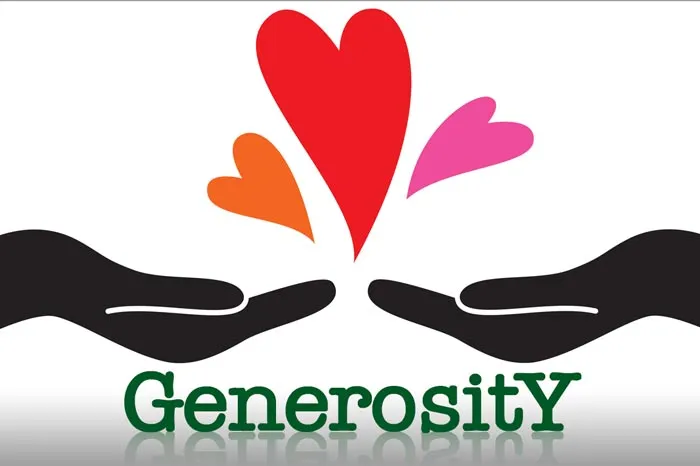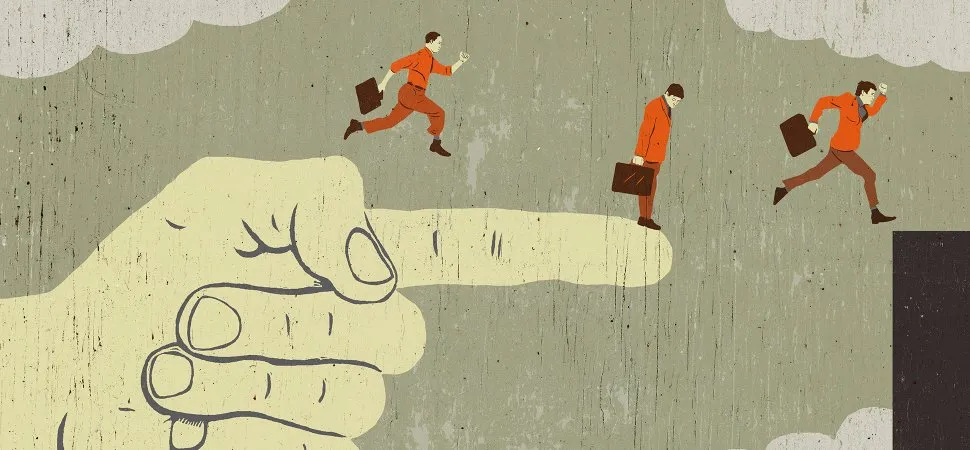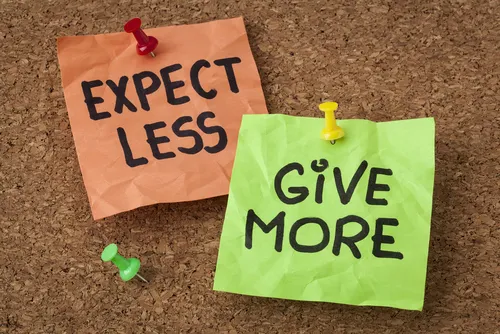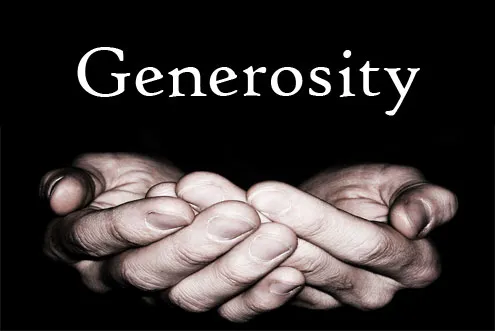
Giving of yourself — whether it be your time, energy or money — isn’t just a boon to those you’re helping. A wealth of research shows that generosity can also have benefits for the giver, ranging from a better outlook at your job, to more years of life. Check out these science-backed reasons to make generosity a regular part of your day.Being stingy — and ashamed of said stinginess — is linked with higher levels of the stress hormone cortisol
Generosity trumps selfishness when it comes to success in the long run, according to a study in the Proceedings of the National Academy of Sciences. University of Pennsylvania researchers found that in a strategic game involving multiple people, being generous — where there is cooperation and everyone benefits from working together — led to more success than being selfish — where one person dominates the other, forcing them to receive a lower payoff. “You might think being generous would be a stupid thing to do, and it is if there are only two players in the game,” study researcher Alexander Stewart explained in a statement. “But, if there are many players and they all play generously, they all benefit from each other’s generosity.
Source

Truly generous people are often successful in life. Not just at work or in the community, but in their personal lives as well. The wonderful thing about generosity is that anyone can become a generous person no matter what station you are in life, how much you have or what you hope to have. Here are seven reasons why success often fills the lives of generous people.
seven reasons why success often fills the lives of generous people.
1•Generous People are Happy People

You will be hard pressed to find a generous person who is grumpy and unhappy. People who are willing to share of their time, possessions, and talents are often some of the happiest people there are. They have a great sense of contributing to the world they live in. All of us seek to have meaning in life and to feel that we matter to the world. For generous people, happiness comes from giving more than from taking.
2•Generous People are More Relaxed

There is no greater stress than feeling that you are in need or that you have to get more in life. Greed as well as a sense of poverty drive people to constantly worry about what they do not have and at times will cause then to make bad choices to try and remedy the problem. Generosity is a state of mind. It is not based on how much money or possessions you have. Generous people can in fact have very little, however, what they do have they are willing to share and are not in bondage to their possessions. There is a great calm and peace that comes when we always sense that we can give of whatever we have.

3•Generous People are willing to Work Hard

A common trait of generous people is that they are willing and happy to work hard for what they have. Success comes through hard work. There is not short cuts or easy paths to take. Generous people realize this and will do what it takes to achieve their goals and dreams in life. Since they tend to be others-focused rather than self-focused they see their own success as a benefit for all, not just for them.
4•Generous People are Kind People

Just as you will not find a generous person who is unhappy, you will not find one who is not kind. Generosity is all about kindness. It is giving of yourself to others to help them in a time of need or to advance them on their journey to success. When you are kind to others you will find that others will be kind to you. A key to achieving success is knowing that what you give you will receive back. Zig Ziglar had it right when he said, “You can have everything in life you want, if you will just help enough other people get what they want.
5•Generous People are Free People

The strongest prisons in the universe are those built on greed, want and selfishness. They are chains that hold you down from achieving real success in life and limit all you hope to do. The only thing that breaks these chains is generosity. Generous people are free to do what they wish, and have what they want because their happiness and success is not dependent on what they keep, but more on what they give away. Have you ever noticed that generous people seem to have more than they need of all of life’s treasures? That is because you will always receive in the same proportion as what you give.
6•Generous People Have Better Relationships

It is just a fact, happy, kind and generous people have more friends, better friends and stronger personal relationships. It is not because others know they can get something from these people, in fact, what they have or do not have has nothing to do with it. Generous people are faithful and loyal and these qualities strengthen all the relationships they have.
7•Generous People are Confident People

When you are not the center of your universe, you will find that you not only feel better about others, you feel better about yourself. Generous people do not get their self-worth from what they give, but by their freedom to give it. The insecurity that comes with greed, want and selfishness is not there to hinder them. They know they can be and do whatever their heart desires.
The right knowledge at the right time can transform your life
God designed us, not to be hoarders, but conduits through which His generosity flows. Generous people live this out. Their mind is consumed with Kingdom advancement, not personal advancement.Generous people know that the more they give away, the more content they become. And yet, they are discontent, but not with their possessions. They always want to give more. Generosity has become their passion, not their stuff.
John Bunyan said, “You have not lived today until you have done something for someone who can never repay you.

Money was just one resource with which they were generous. They found other ways to be generous as well. If they had season tickets to watch a sports team, they would give away many games to those who could not afford to go to such an event. They helped provide baby goods for single, pregnant mothers. The list could go on. Their generosity invaded all areas of their life, not just their bank account.
Generosity was not determined by their level of wealth. It was present before they become wealthy. And it would still be present if they lost everything. Whether they have much or little with which to be generous, they give.

Giving money to someone else actually makes you feel better than spending it on yourself
Why it's important to be Generous
This is because being generous and kind encourages us to perceive others in a more positive light and fosters a sense of community, a feeling of interconnectedness. Being generous also makes us feel better about ourselves. Generosity is both a natural confidence builder and a natural repellant of self-hatred.
Give a minnow an upvote and they'll eat for a day. Give a minnow a resteem and they'll eat forever
Generosity — the quality of being kind and understanding, the willingness to give others things that have value — is often defined as an act of selflessness; however, studies are now showing that generosity is actually (selfishly) in your best interest. Practicing generosity is a mental health principle, and it could be the very key to a happy and healthy life
Dalai Lama famously said- “If you want others to be happy, practice compassion. If you want to be happy, practice compassion

Being generous also makes us feel better about ourselves. Generosity is both a natural confidence builder and a natural repellant of self-hatred. By focusing on what we are giving rather than on what we are receiving, we create a more outward orientation toward the world, which shifts our focus away from ourselves. While maintaining a healthy level of self-awareness and sensitivity to oneself is important, too often we narrow in on ourselves with a negative lens. We spend too much time listening to the “critical inner voice“ in our heads, which scrutinizes our every move and nags at us with negative thoughts towards ourselves and others. These negative thoughts undermine our confidence and can lead to self-sabotage. Being generous distracts us from the critical inner voice’s barrage of nasty thoughts and creates a strong argument against it as well. When we see someone else benefiting from our kind actions, for instance, it is hard for the inner voice to argue that we are worthless.
The act of generosity & kindness can be fulfilled to upmost sincerity through the following ways
3•ways to fully practice Generosity
•Show appreciation.

Remember that gratitude is an important part of the equation. Show your appreciation for the generosity that is directed toward you, even if you feel shy or uncomfortable. Resist the temptation to say things like “This is too much,” or “You shouldn’t have.” Instead just say “Thank you!” Or, better yet, let the person know what their generosity meant to you. Generosity is truly the gift that keeps on giving. Each day life presents us with hundreds of opportunities to be generous; by making a lifestyle out of generosity, we can do ourselves and others a world of good.
•Accept appreciation

It is important to be open to the people who express appreciation toward you. Generosity is a two-way street, allowing someone to express their gratitude is an important aspect of generosity and part of what makes you feel closer to them. As researchers in the Department of Psychology at University of North Carolina at Chapel Hill have discovered, “The emotion of gratitude uniquely functions to build a high-quality relationship between a grateful person and the target of his or her gratitude, that is, the person who performed a kind action.” So it is important to not brush off a “thank you” with comments like “Oh, it was nothin
•Accept the generosity of others.
Some people have a much easier time being giving than receiving. However, it is important to let others do things for you. I call this the generosity of acceptance. Being pseudo-independent or self-denying robs your loved ones of the opportunity to feel the joy of giving. Accepting the generosity of others may make you uncomfortable if you felt unlovable or unworthy in your early life. Generosity is often an act of love, and, though it may seem counterintuitive, many people respond negatively to being loved

Generosity is most effective when the gift you offer is sensitive. Think about what the other person wants or needs. It’s not always about material things; it’s about being giving of yourself. Sometimes just being present and available to a loved one who is having a hard time is the greatest gift you could possibly give.
Give a minnow an upvote and they'll eat for a day. Give a minnow a resteem and they'll eat forever
Be Generous
